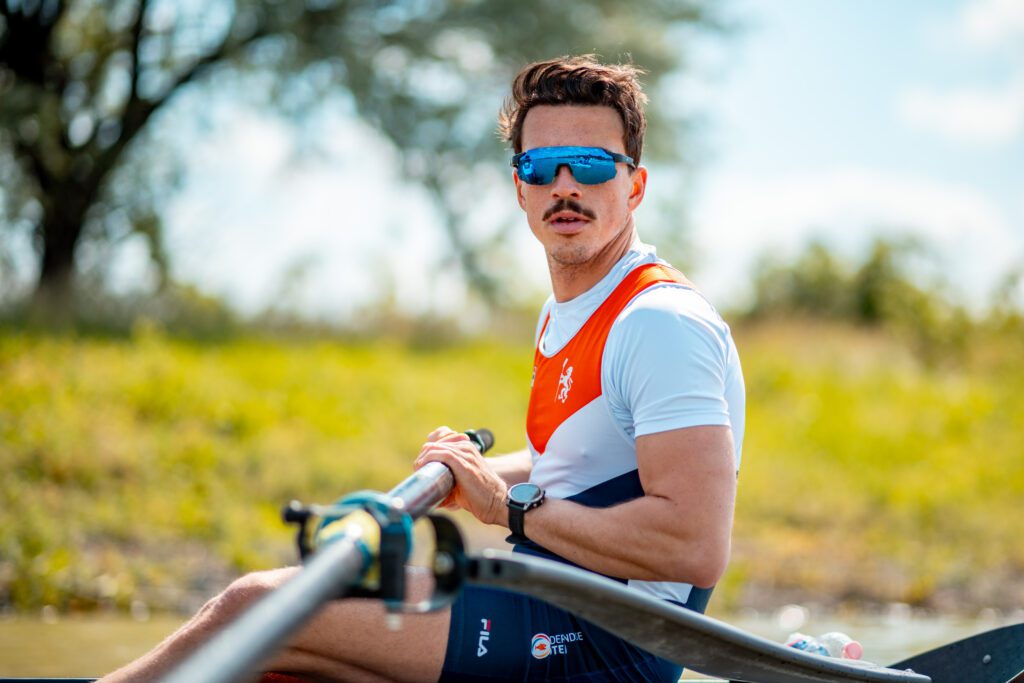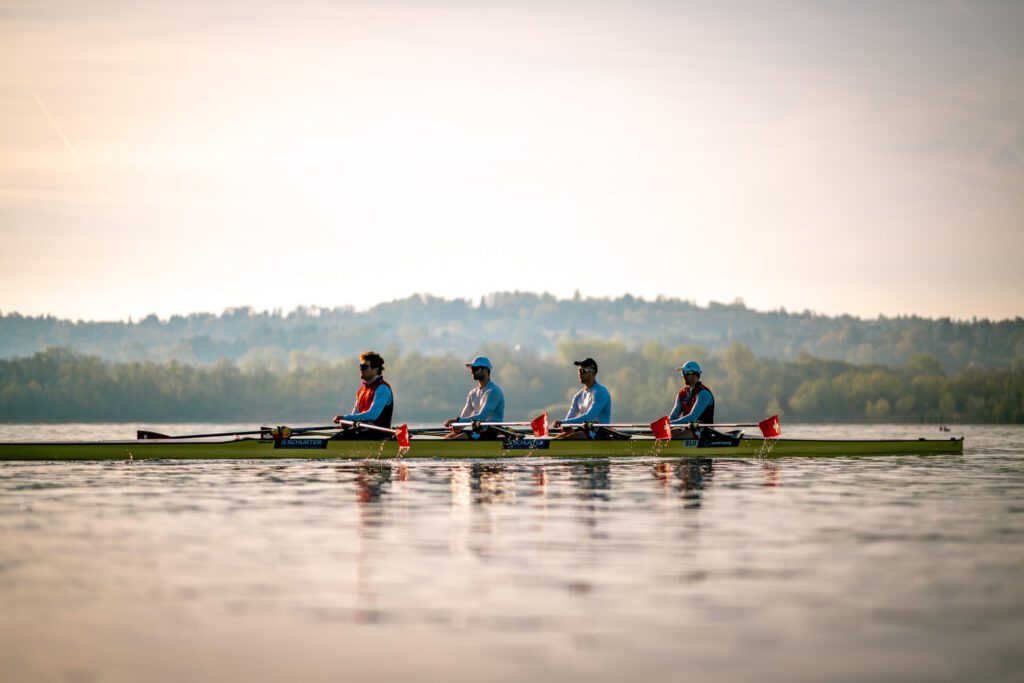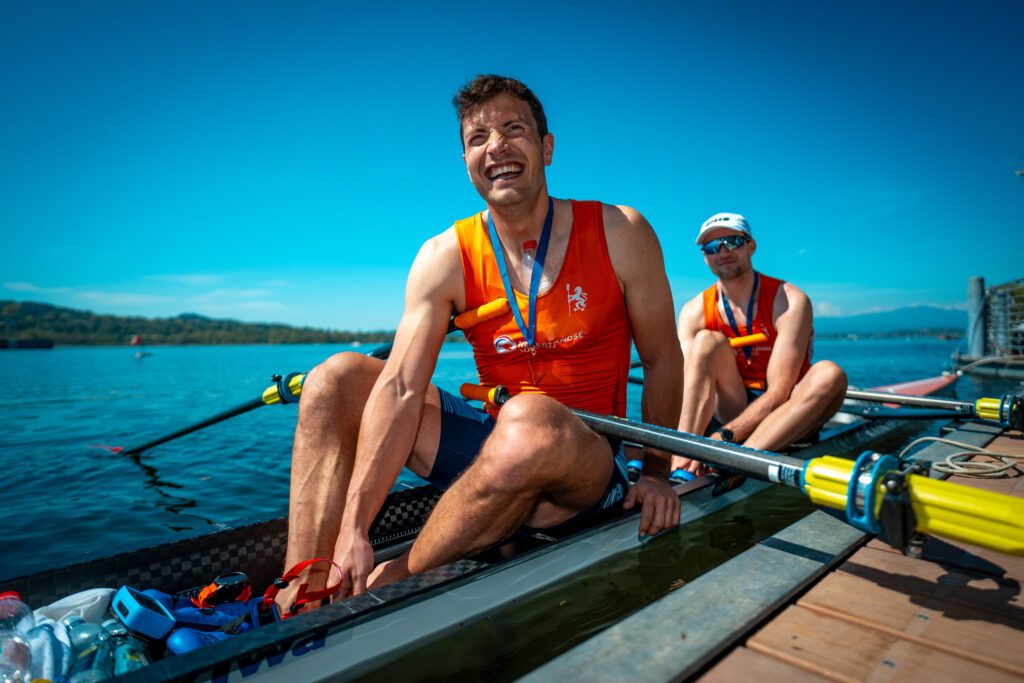A few spots of rain on the taxi windscreen early on Saturday morning, then blasting sunshine again all day in Tokyo bay. “Thunderstorms, moi?” said the weather. “It’s not Monday yet”. Indeed not, and with a start time hauled earlier for both broadcasting and schedule reasons, Saturday began with singles and doubles repechages and then finished off the remaining heats including the eights. Round 1 done and dusted for everyone – an important stage to reach.
One person who won’t be progressing any further is Dutch M1x Finn Florijn, who withdrew ill from the repechages, only to have his sickness confirmed as COVID-19 later in the day. Under the newly clarified rules for isolation, he may be able to come out after 7 days if he has two negative tests, but it’s too late for his rowing hopes, and he’s out of the competition. Another 17 cases have been confirmed over the last 48 hours, but Florijn is the only Olympic Village athlete, there is one non-Village athlete and the rest are support staff or techs. It was noted by NLRoei that Florijn travelled to Japan with three other people from the Dutch squad who have already tested positive.
Back to the racing, and the fieriest and most difficult contests of the day were, unsurprisingly, the eights. Seven crews, two heats with one finals place available in each, was ever a recipe for good racing. In the women’s event the Kiwis with Grace Prendergast and Kerri Gowler on board picked off first China and then Canada with great aplomb after the two sweep stars had raced earlier to win their pairs. This despite the fact that the eights rescheduling had happened only 18 hours before, forcing a doubling-up neither had particularly expected.
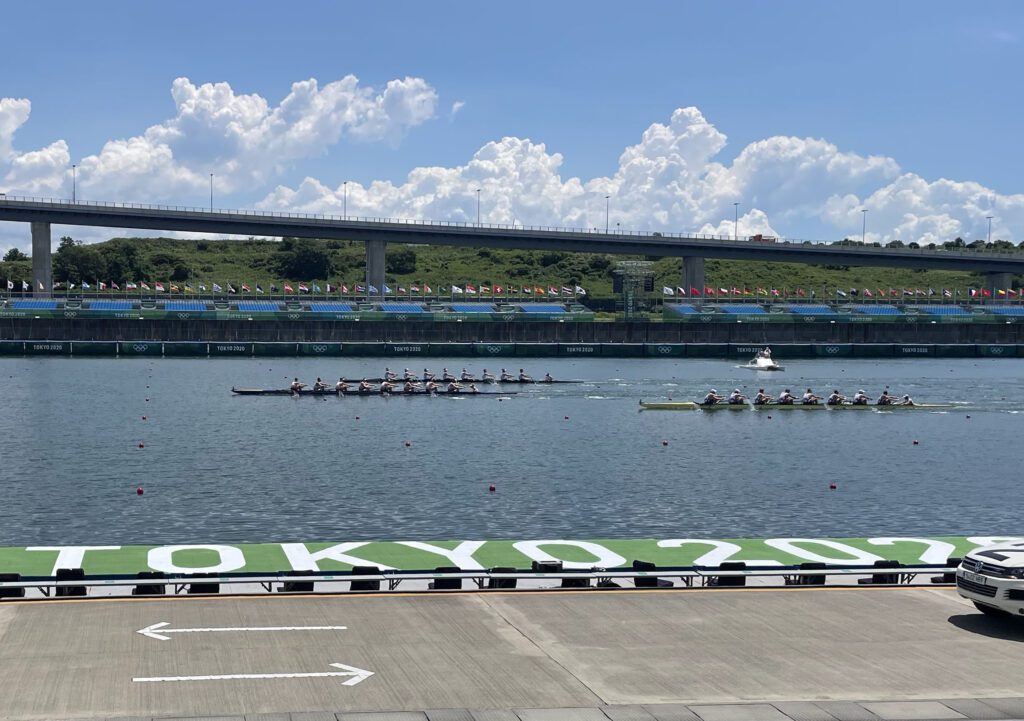
Photo GBR M8+ finishes third behind NED and NZL Saturday
Credit Rachel Quarrell
“Every race throws something different at you so you just don’t know what to expect. It doesn’t get easier but I guess you get more confident so that we know no matter what’s thrown at us we can cope with it,” said Prendergast. “It didn’t really faze us too much, we’ve done two races in a day multiple times, so I guess we were almost happy that we have an extra day off after this now.” However, jumping into the eight on the same day has its benefits. “It’s a lot more intense”, said Gowler, “But it’s a lot more fun, and it’s a quicker race.” Canada gave them a very good run for their money, and a similar pattern was seen in the second heat, where despite whisking past Romania, the USA found themselves under increased threat again in the closing strokes. With five crews within 3 seconds of one another, and only Britain’s combination looking unlikely to make the final, the women’s eights could be much more of a thriller than in most previous Olympics.
But as if desperate not to be displaced as the most exciting big-boat event, the men’s eights served up a massive attack from the USA and technical headaches which the British men’s eight let themselves succumb to for a dreadful start to the European champions’ regatta. USA has a narrative that they have been trying to reclaim their dominance in the eights for several Olympics, and have indeed won the M8+ gold 12 times in the modern era including a run of eight consecutive victories 1920-1964: more than any other country. But their only win of the last fifty years was in Athens 2004, and since then their best result was bronze in Beijing. The 2004 gold was masterminded by Mike Teti, once again coaching the eight here, while trying not to be distracted by an investigation into allegations against him of bullying. On Saturday his crew came out like bullets, putting the Germans into the unusual position of being led by several seats to halfway, until a cool-headed German push put the 2019 world champions back in charge for a half-length win. A serious statement of intent from the USA, who look very dangerous. Romania and Australia drifted in miles back, clearly saving their energy for the make-or-break repechage.
For the next heat, things went wrong. A delay on the start, no traffic lights, and unsettled crews, particularly Britain who let the problems get to them. The result was a race in which they were always on the back foot, never regaining the trucking rhythm which has seen them turn over Germany this season. FISA’s take on the problem was that it was both human and technical errors. “The heat was aligned, the white light was illuminated by the aligner and the starter had started the roll call arriving at the red light before the start,” said FISA executive director Matt Smith. “Then the alignment was lost so the starter stopped. The alignment was set again but the red light from the previous attempt was still on and blocked. The system did not allow for a new red light so the start had to be given manually. This is being investigated now.”
After a lengthy delay the Kiwis, Dutch and Brits ended up with two roll-calls immediately before the start — possibly due to nervousness or confusion on the part of the starter — and were held at extended frontstops for a full 53 seconds before the starter yelled “Go!” Something was up with the British boot/bucket too – the plastic contraption which holds the bows in place to avoid false starts and maintain alignment. It released very slowly for unknown reasons, apparently leading to scratches on the shell afterwards. “The first thing I did is look round because I thought we were going to mount the bucket,” said Moe Sbihi. “So part of that is on me and the way I dealt with that. But regardless of the start, it wasn’t good enough in the first k, the Dutch did a good job of getting out and putting their nose ahead. Once you’re in that position in the eight, it becomes a bit of a luxury to be there.” Playing catchup, or trying to, the Brits could not manage to get back on terms with either the Dutch, who won in storming fashion, or the Kiwis, who pressed the Dutch hard but could not quite draw level. Both of them coped better with the delays and muddled start than the GB crew. One boat through means the Dutch and Germans have the rest of the week off until next Friday, with the rest waiting for a tense repechage on Wednesday which will decide both places and lanes for the final.
Smith added, “There is also an issue in that the sensitivity of the start boots has been increased and, when the bow is too quickly or strongly inserted, the boot drops to avoid damaging the boot. This is a result of the damage in Glasgow back in 2018. So, like the CHN W8+ in heat 1 [today], if the rowers row the boat into the boot, it goes down. We have instructed everyone to only have the boat holder gently press the bow into the boot. Finally, the boots were lower than usual so the big boats’ bows were sometimes jumping out of the boots which also happened today. They have been raised now.” That certainly affected some of the women’s crews, but this hiccup is unlikely to have caused the specific issue with the GBR shell.
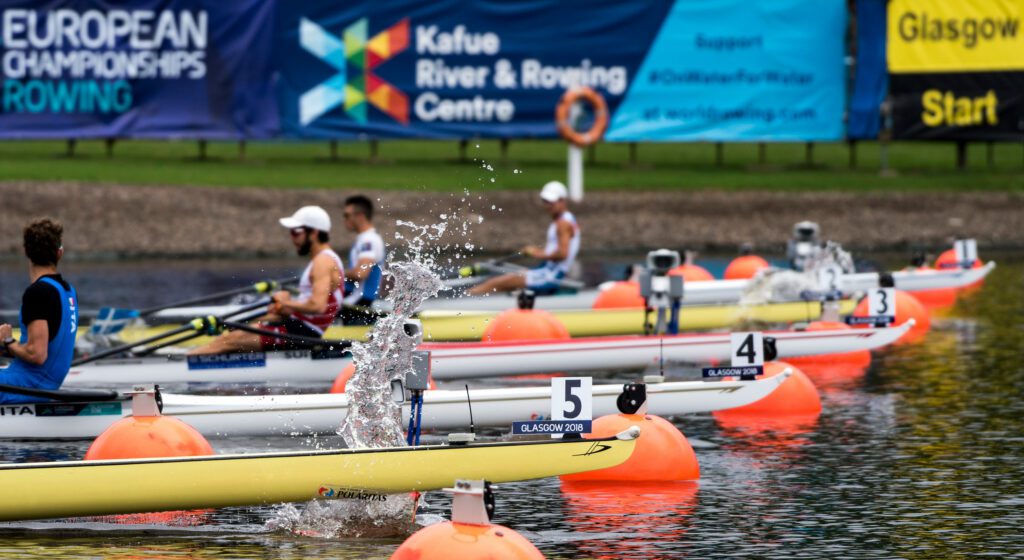
Photo The starting blocks in Tokyo have been modified to avoid a repeat of this incident, captured at Glasgow in 2018, where they failed to drop on the starting buzzer causing damage to the boats.
Credit Benedict Tufnell
Earlier on the Czech M2x and Chinese W2x became the first crews to have to book their tickets home, finishing 13th/13 overall and fourth in their repechages. The COVID rules for this Games state that once athletes’ competition is over (and assuming that they’re not virus-positive) they must depart the country no more than two days later. By Tuesday they will be back at home watching the rest of the rowing on TV. Very sad, but there will be more early departures to come, first the 13th-ranked pairs on Sunday, then the 7th-ranked eights on Wednesday, and after that the bottom crews when they have raced their low finals.
The women’s pairs dented the biggest GB story in this year’s rowing team, that of double Olympic champion Helen Glover’s return to rowing as a mother of three. She’s the first GB woman to row at the Olympics after having kids, because in the 1970s-1990s as the women’s rowing was flourishing, it was normal for motherhood to be combined with retirement from the team. Unfortunately third place — and never in real contention for the win — in one of the W2- heats suggests that she and Polly Swann will have to do a great deal to pull up to the standard needed for a medal, let alone gold. And gold is what they have come here for. Instead the attention was at the front of the races where the Kiwis and Aussies looked superb despite each having a second race to do later (the AUS W2- are in their W4-), and Canada’s pair did a fine job fending off the ever-threatening Romanians. If I didn’t think that NZL and possibly also AUS had a big gear lurking to use later, I’d tip this as a close event, but it’s more likely to be a coronation with the big race being for the minor medals.
The men’s pair may also be a coronation, after the Sinkovic brothers continued their flight towards sweep gold to add to their Rio win in the double sculls. They naturally rate high so the race data belies what we saw at the course, but after coming through the Danes steadily at about 800m, they had plenty of time to relax and cruise to the line, and still look like the pair to beat even though Romania’s Marius Cozmiuc and Ciprian Tudosa matched their time in a tougher heat.
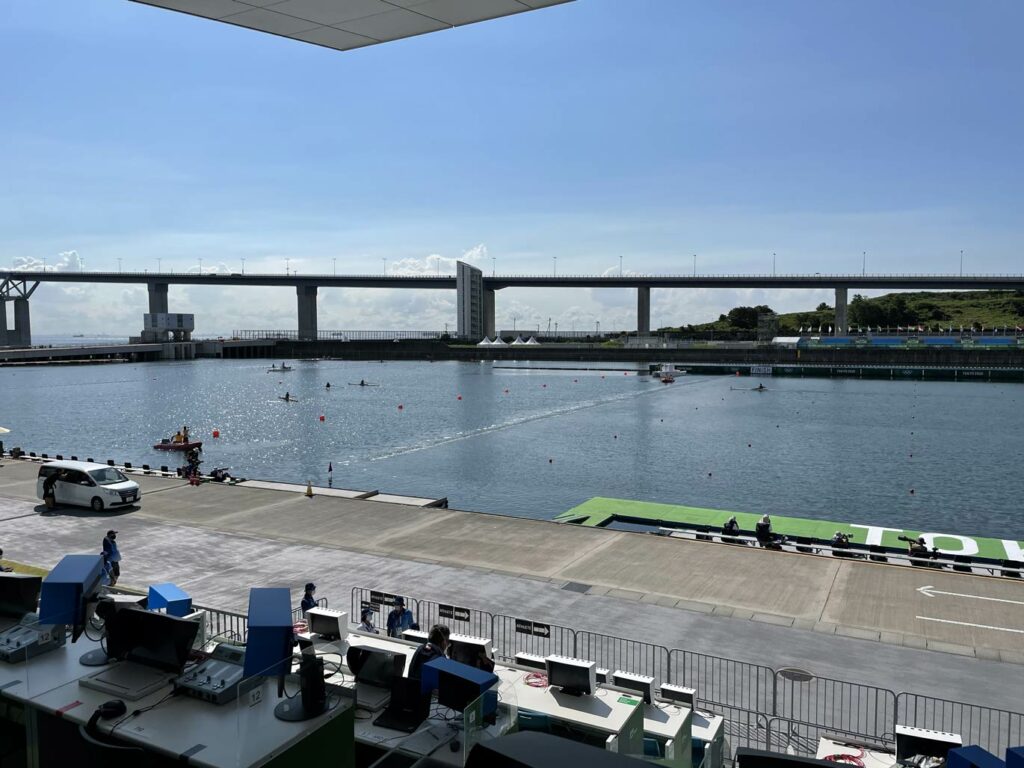
Photo View over the finish line from the media grandstand in Tokyo
Credit Rachel Quarrell
The lightweight doubles boasted two very tight races — the first LW2x and last LM2x heats — and due to the extremely tight qualification for this size of event, will become even more nailbiting as the week goes on. The poor lightweights were victims of the FISA schedule switch, which had racing start early in order to avoid issues with TV schedules once the eights had been added to the programme, since they have to weigh in at the course 2 hours before each race. Mind you, all the rowers are up at what my dad likes calling sparrowfart. “This last week has all been at five o’clock because rowing is insane,” said Sbihi. “When you walk into the bus transport centre in the Village, the only people there that early are rowers.”
So, finally, to the fours, who have only 10 entries each but are fiercely competitive. The Australian women’s four showed that doubling up was no problem: this was always scheduled to be their most difficult day, but they kept their composure when being closely harried by Ireland, and came over the line after leaving it as late as possible to sprint and confirm the win. Unleashed, with no need to worry about lactate buildup in their legs, they should be very threatening later in the week. The Dutch were the other W4- winners, no surprise since they’ve been ones to watch all season. They had the Chinese at their heels but didn’t even have to lift the rate, and were considerably faster than the Canadians and Brits who will have been disappointed not to be in contention.
No doubling-up in the M4-, but a renewal of the now ancient rivalry between GBR and AUS looks very likely after each won their heats in very similar ways. The USA were clearly blowing the barn doors off to make a point in the Aussie heat, but the boys in green and gold had plenty in hand and looked very good in race mode. For the second heat it was the Italians who got closest to GBR, but likewise the Brits never looked threatened even though they said it wasn’t technically their best row. So four already through to the final, and it’s pretty clear who have the biggest ambitions for gold. Another chapter in the story ready to be written.
